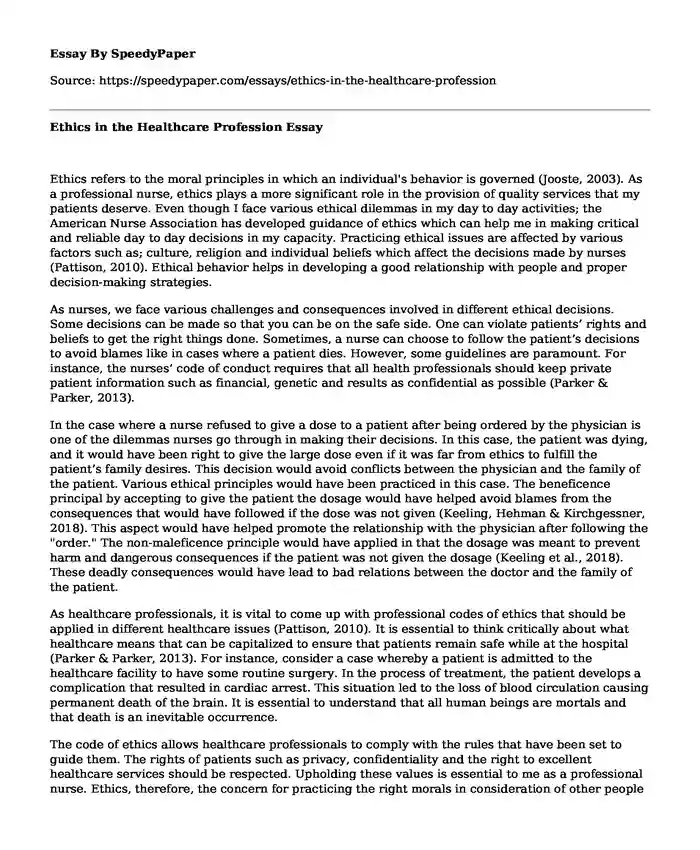
| Type of paper: | Essay |
| Categories: | Communication Government Society Disorder |
| Pages: | 3 |
| Wordcount: | 638 words |
Ethics refers to the moral principles in which an individual's behavior is governed (Jooste, 2003). As a professional nurse, ethics plays a more significant role in the provision of quality services that my patients deserve. Even though I face various ethical dilemmas in my day to day activities; the American Nurse Association has developed guidance of ethics which can help me in making critical and reliable day to day decisions in my capacity. Practicing ethical issues are affected by various factors such as; culture, religion and individual beliefs which affect the decisions made by nurses (Pattison, 2010). Ethical behavior helps in developing a good relationship with people and proper decision-making strategies.
As nurses, we face various challenges and consequences involved in different ethical decisions. Some decisions can be made so that you can be on the safe side. One can violate patients' rights and beliefs to get the right things done. Sometimes, a nurse can choose to follow the patient's decisions to avoid blames like in cases where a patient dies. However, some guidelines are paramount. For instance, the nurses' code of conduct requires that all health professionals should keep private patient information such as financial, genetic and results as confidential as possible (Parker & Parker, 2013).
In the case where a nurse refused to give a dose to a patient after being ordered by the physician is one of the dilemmas nurses go through in making their decisions. In this case, the patient was dying, and it would have been right to give the large dose even if it was far from ethics to fulfill the patient's family desires. This decision would avoid conflicts between the physician and the family of the patient. Various ethical principles would have been practiced in this case. The beneficence principal by accepting to give the patient the dosage would have helped avoid blames from the consequences that would have followed if the dose was not given (Keeling, Hehman & Kirchgessner, 2018). This aspect would have helped promote the relationship with the physician after following the "order." The non-maleficence principle would have applied in that the dosage was meant to prevent harm and dangerous consequences if the patient was not given the dosage (Keeling et al., 2018). These deadly consequences would have lead to bad relations between the doctor and the family of the patient.
As healthcare professionals, it is vital to come up with professional codes of ethics that should be applied in different healthcare issues (Pattison, 2010). It is essential to think critically about what healthcare means that can be capitalized to ensure that patients remain safe while at the hospital (Parker & Parker, 2013). For instance, consider a case whereby a patient is admitted to the healthcare facility to have some routine surgery. In the process of treatment, the patient develops a complication that resulted in cardiac arrest. This situation led to the loss of blood circulation causing permanent death of the brain. It is essential to understand that all human beings are mortals and that death is an inevitable occurrence.
The code of ethics allows healthcare professionals to comply with the rules that have been set to guide them. The rights of patients such as privacy, confidentiality and the right to excellent healthcare services should be respected. Upholding these values is essential to me as a professional nurse. Ethics, therefore, the concern for practicing the right morals in consideration of other people and understanding the effects the decisions made.
References
Jooste, K. (2003). Ethics in healthcare. Africa Health, 25, 10-14.
Keeling, A. W., Hehman, M. C., & Kirchgessner, J. C. (2018). History of professional nursing inthe United States: Toward a culture of health. New York: Springer.
Parker, D. M., & Parker, M. (2013). Ethics and Community in the Health Care Professions. Hoboken: Taylor and Francis.
Pattison, S. (2010). Emerging values in health care: The challenge for professionals. London: Jessica Kingsley Publishers.
Cite this page
Ethics in the Healthcare Profession. (2023, Jan 02). Retrieved from https://speedypaper.net/essays/ethics-in-the-healthcare-profession
Request Removal
If you are the original author of this essay and no longer wish to have it published on the SpeedyPaper website, please click below to request its removal:
- Marketing Essay Example on Successful and Failed Products
- Fallen Leader - Leadership Analysis Essay Sample
- Essay Sample with Article Summary on the Current Stand of American Politics
- Essay Sample: Stages of Team Development in the DodgeBall Movie
- Essay Sample: The Context and Social History of the Case
- Essay Sample on Alternatives Beyond Physical Scientific Reasoning
- Free Essay. Journal Suffering
Popular categories




